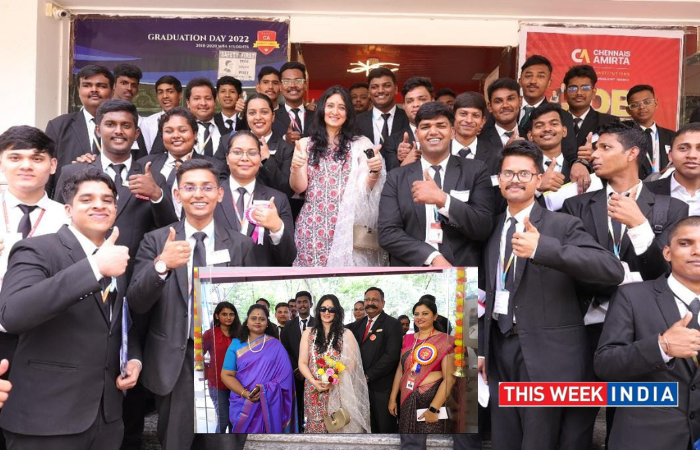Allocation of funds for innovation and skilling will also help those who are working in the healthcare sector.
“The focus is on growth in this budget and the government is clearly looking at a long-term strategy. The schemes to get more people into the formal sector will go a long way in tapping into the potential of India’s young workforce, and the government’s continued commitment to infrastructure development is a big boost for economic growth and opportunities. This helps build on the momentum created in the previous two terms.”
Sudarshan Venu, Managing Director, TVS Motor Company.
Indian democracy witnessed a watershed moment at the Union Budget 2024-25, as policymakers focused on nine key areas to deliver a comprehensive growth roadmap through strategic allocations. Employment & upskilling, Infrastructure, Innovation & Research and development, and taxation reforms among others dominated GOI’s financial blueprint for the rest of the fiscal year. This marked a critical point for India’s holistic growth across sectors, as numerous corporates celebrated the focused push in different directions.
The GOI maintained its support to businesses operating in the startup, infrastructure development and EdTech sectors. Finance Minister Nirmala Sitharaman called for abolishing the Angel Tax, a milestone for the private entities. Apart from streamlining taxation, announcements regarding new infrastructure projects and upskilling youth set the tone for the budget.
A provision of INR 1.48 lakh crore was allocated for education, employment and upskilling, coupled with the announcement of loans up to INR 10 lakh for higher education. The centre also announced up to 5 schemes to strategically push the employment rate with an INR 2 lakh crore package, consisting of initiatives that facilitate employment and upskilling of over 4.1 crore youth in the next 5 years. Additionally, the Indian manufacturing industry received a much-needed boost through the incentivization of job creation in the industry. Also, the announcement of key road connectivity projects, along with bridges and airports offered a bright future outlook for the construction sector. Furthermore, the abolition of the Angel Tax and streamlining corporate taxation for foreign companies to increase FDI inflow and growing emphasis on digitization highlights India’s strategic blueprint for the rest of the FY.
Organisations operating in these sectors — Euro Panel Products Limited, GUVI, QuackQuack and Xyst Care hailed the forward-thinking growth roadmap in the budget, as these entities became direct beneficiaries of the government’s commitment to supplement national growth.
Focus on upskilling in a comprehensive budget
Mr. Arun Prakash, CEO and Founder of GUVI, lauded the centre’s focus on employment and upskilling, along with abolishing Angel Tax in the Union Budget, saying, “The financial blueprint laid out in the Union Budget puts a special emphasis on upskilling programmes targeting Indian youth. Furthermore, the package of five schemes designed to facilitate employment and upskilling with a strategic allocation of INR 2 lakh crore will have long-term favourable impact on the future of countless Indian students and professionals alike. While budgetary initiatives are focusing on upskilling 20 lakh youth directly in the next 5 years in trending and relevant, industry-appropriate courses, the long-term implications of this will be immense. Also, the abolition of Angel Tax will help the overall EdTech sector significantly through a unique opportunity to ensure scalability and growth, and attract investments simultaneously.”
Growth-oriented Infrastructure development push
Mr. Divyam Shah, Director of Euro Panel Products Limited, feels the government’s continued push on developing and revitalising infrastructure projects will assist the overall construction sector to ensure growth, “The centre’s renewed interest in maintaining its focus on infrastructure development in the Union Budget is a gratifying sight. The construction of several key road connectivity projects, including highways and others, along with a new airport in Bihar and across India aligns with Eurobond’s long-term objectives. Furthermore, the incentivization of job creation in the manufacturing sector will help the sector to generate more jobs for skilled professionals, helping to streamline and increase the efficiency of the manufacturing process, leading to future growth.”
Streamlining taxation significant boost for startups
Mr. Ravi Mittal, Founder & CEO of QuackQuack, feels abolishing Angel Tax will have favourable long-term implications for the Indian startup ecosystem, “This 2024-25 Union Budget is highly influential to ensure long-term success in the startup ecosystem. By doing away with the Angel Tax, startups have been enabled to encourage a renewed business approach and enhance valuation. This will enable startups to undertake expansion initiatives without concerns about taxation, while also attracting increased funding from angel investors. Furthermore, the centre’s emphasis on upskilling will provide a viable pipeline of trained professionals for startups, ensuring long-term growth and scalability. “
Ms Gunjan Agarwal, Co-founder of XYST Care, states , “Abolishing Angel Tax will have a long-term impact on startup founders. This will not only motivate angel investors, but help to encourage entrepreneurial spirit in the Indian business domain. Additionally, the job generation push, coupled with the government’s financial assistance will help startups to acquire more talented professionals, leading to cumulative growth in the long-term. This Union Budget is full of opportunities for Indian startups pushing to become the next Unicorn, and governmental assistance is bolstering it to ensure success and growth.
The latest budget stresses ‘Viksit Bharat’ yet again, promoting a strategic push in key sectors to usher in economic growth and viability to supplement India’s bid to become a developed nation by 2047. Optimization of resources to address key concerns in upskilling, employment, agriculture and technology holds the potential to lead to a promising future and assist the nation to become a $5 trillion by 2027, as projected by the Ministry of Finance. The comprehensive union budget also seeks to provide uniformity in growth across sectors, helping to facilitate a new chapter in India’s progressive trajectory.
The budget is economy-centric and especially targets grassroots issues like employment and rural economic stress. Multiple direct and indirect schemes and announcements will target the upliftment of the poor, women, youth, and farmers. The finance minister has made this budget to enhance employment, increase skill sets, ease business for MSMEs, and provide tax measures for the middle class. From the capital markets point of view, it would be slightly disappointing as far as taxation is concerned. The economic measures announced are the need of the hour for rural employment and reduce stress in the MSME space. This budget has targeted the pain points in the economy.
This budget focuses on the rural economy, employment, and MSMEs. The biggest beneficiary from a stock market perspective will be consumption space especially FMCG and Auto (2-wheelers)
Siddarth Bhamre, Head of Research at Asit C Mehta Investment Interrmediates Ltd (brokerage firm)
“The Finance Ministry’s focus on youth development, job creation and the skilling of millions of young learners will establish a robust foundation for India’s economic strength and position it as a global hub for skills. The comprehensive package of schemes, with an estimated cost of Rs. 2 lakh crores, aims to facilitate employment and skilling initiatives, significantly contributing to job creation and skill enhancement across various candidate categories in the country. The direct benefit transfer of one month’s salary to new entrants in the workforce will help expand the base of formal employment, benefiting 2.1 lakh young people in India.
Higher education has a crucial role in executing these next-generation initiatives. EdTech platforms, in particular, have proven to be key differentiators in democratising education through innovative and cutting-edge technology. They are significantly upskilling Indian youth to enhance employability and contribute to executive learning, thereby creating a substantial upskilled workforce to power the economy and we look forward to Edtech’s continued participation in India’s growth narrative.”
Anish Srikrishna, CEO, TimesPro
“The recently presented Budget 2024-2025 demonstrates a significant commitment to improving the lives of children through comprehensive allocations in education, health, and child welfare. Over ₹3 lakh crore allocated for schemes benefiting women and girls ensures that these crucial segments of the population receive support for education, healthcare, and economic participation. Additionally, the launch of the Pradhan Mantri Janjatiya Unnat Gram Abhiyan is set to benefit 5 crore tribal people, which includes a significant number of children, by improving their socio-economic conditions. Additionally, the allocation of ₹1.48 lakh crore for education ensures significant investment in infrastructure, quality of education, and skill development. The budget speech also mentioned a centrally sponsored scheme that aims to skill 20 lakh youth over five years by upgrading 1000 Industrial Training Institutes (ITIs). Upgrading ITIs and skilling initiatives prepare youth for employment, reducing unemployment and driving economic progress. This skilled workforce can attract global businesses and enhance India’s competitiveness. Although specific child health allocations are not detailed, the focus on inclusive healthcare ensures that children and adults receive necessary medical services. Healthy children grow into productive adults, reducing future healthcare burdens and increasing societal productivity. The Budget 2024-2025 reflects a robust commitment to fostering the well-being and development of children through targeted investments. Strategic allocations in child welfare will lay a solid foundation for achieving a Viksit Bharat. These investments are not just expenditures but critical enablers of a developed, equitable, and prosperous India”
Unlike SSY or PPF, NPS Vatsalya is focused on creating a pension corpus rather than just savings, which aligns well with long-term financial security goals. The automatic transition from a minor’s scheme to an adult NPS plan offers a seamless process for continued savings and investment. This scheme integrates child welfare into broader financial and social security frameworks, reflecting a more holistic approach to child welfare beyond immediate needs.
It represents a shift towards future-oriented policy measures aimed at ensuring long-term benefits for children as they grow into adulthood.
By targeting minors, the scheme can be inclusive of a wide demographic, including those from economically weaker sections who might not otherwise consider long-term savings for their children.
However, the challenge lies in amplifying its awareness and Reach, ensuring that all parents, especially in remote or underprivileged areas, are aware of and can access NPS Vatsalya. Similarly, some parents might find pension schemes complex and might require additional support to understand the benefits and operation of the scheme. The effectiveness of the scheme will depend on the returns generated by the investments made under NPS Vatsalya. Parents will need assurance of adequate returns to meet future needs.
NPS Vatsalya is a forward-thinking initiative that aligns well with the goals of child welfare by promoting early financial planning and ensuring future stability for minors. Its focus on long-term pension benefits represents a significant step towards comprehensive child welfare, integrating financial security into the broader social safety net. However, its success will depend on effective implementation, accessibility, and the ability to address the challenges faced by different segments of the population. The scheme reflects a commitment to the future well-being of children and presents an opportunity to cultivate a culture of long-term financial responsibility among Indian families”
Sudarshan Suchi
CEO, Bal Raksha Bharat









